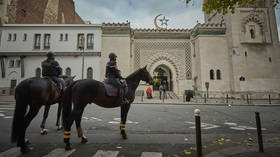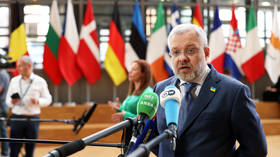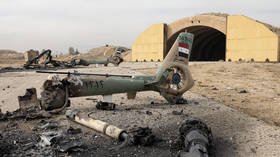As bodies mount up in terrorist attacks, Europe must realise Islam itself is not the problem but how & why people get radicalised

The West needs to thoroughly re-examine its relationship with Islam and rethink its imperialist policies in the Middle East if we are ever to see an end to the atrocities witnessed in the last week in Austria and France.
On Monday evening, a number of gunmen opened fire in numerous locations across the Austrian capital of Vienna, killing at least four civilians.
Condemned as a “repulsive terrorist attack” by the country’s chancellor, Sebastian Kurz, the shootings are the latest in a series of incidents involving Islamists which have included the killing of three people in Nice and the beheading of a teacher in Paris.
Wave of Terror | Three killed, several injured in #Nice church knife attackMORE: https://t.co/Ipb6PS9HgRpic.twitter.com/kVLcqFDASa
— RT (@RT_com) October 30, 2020
The attacks have come in the wake of a broader controversy surrounding Islamic fundamentalism over the legacy of the cartoons of the Prophet Mohammed published by Charlie Hebdo, which has seen France’s President Emmanuel Macron take a tough stance against extremism. His remarks have provoked anger and unrest across the Muslim world, including a heated diplomatic row with Turkish President Recep Tayyip Erdogan.
As Vienna has demonstrated, the consequences of this anger are not just limited to France, but are quickly becoming a problem all over Europe. And while we have clearly arrived at a flashpoint, the situation is not new: the continent has a long-standing radicalisation problem which governments have struggled to reconcile, leading to a proliferation of terrorist attacks in recent years.
This has created friction between those who advocate policies of multiculturalism and openness, and those who favour assimilation and anti-migrant policies. The answer, however, is not so simple; afflicted countries must avoid drawing themselves into a broader conflict ‘against Islam’ which exacerbates such identity politics, and stop promoting instability within the Middle East.
What we understand as ‘Islamic fundamentalism’ or ‘Jihadism’ is often generalized as a pathology of the Muslim religion itself, which has lent itself to plenty of debate that might be described as ‘Islamophobic’ in recent years. To its critics, the faith is presented in zero-sum orientalist discourse as inherently violent and backwards, compared to the enlightened and civilized values of the West.
Also on rt.com Karin Kneissl: France has a sad history of terrorist attacks, and that history is set to continueThere is the school of thought that Muslims ought to be made to accept ‘Western values’ and apparently it is the failure of Muslim populations to accept or ‘integrate’ with this superior way of living that is the real root of all terrorism, which is far too easily associated as a product of the faith’s teachings.
Except it is not that simple. Islamist terrorism is not so much a profession of extreme faith as it is a mantra of extremist identity politics. While of course it is using Islam as the faith to justify its goals, understandings and ends, it is nonetheless the application of Islam as a political ideology.
Whilst such acts of sporadic violence have been influenced by particular dogmatic schools of the faith, such as Wahhabism and Salafism, the point of analysis for Islamist terrorism and its associated groups begins with a study of politics, economics and sociology, rather than theology, and the assumption that every believing Muslim will spontaneously be prone to such activities is misleading. As with any other human being, who Muslims are and what they do is a manifestation of the material circumstances in which they exist.
What then, causes radicalisation and leads individuals to commit such acts? The faith itself is not the problem, rather the feelings of resentment, alienation and disillusionment that play upon one’s comprehension of identity and create receptivity to such ideologies.
Most involved in these attacks happen to be young men aged in their teens, 20s and 30s. One may note the general absence of women and older men in terrorist attacks; instead they are carried out by a demographic which may more vividly feel a sense of despair, hopelessness and believe they have no stake in society. They may not even be particularly strong believers of the faith in practice. Radicalisation is not a theological problem, it’s a social one.
Also on rt.com France has paid an appalling price for its lax attitude to radical Islam and a clampdown on extremists is long overdueSo, while Macron seeks to affirm assimilatory policies and consolidate the superiority of French values against Islam, this isn’t really the source of the problem. For example, take the new anti-separatist law which introduces a fine for those who reject a doctor based on gender.
There can be much comment about this, but is your elderly Muslim patriarch who refuses a female doctor really a terrorist in waiting? Is radicalisation solely about conservative Muslim values which are seen as incompatible with Western ones?
Rather, the problem lies in how an extremist identity politics is created within pockets of instability not at home, but abroad, and subsequently takes root within groups who struggle to fit in society, for whatever reason, at large.
This is not just true for France, but every country in Europe, as seen in Vienna. One cannot ignore the legacy of repeated Western interventions in the Middle East which have created the very sense of anger, injustice and chaos that have allowed radical groups to take hold and spread their message abroad.
Interventions in Syria, Iraq, Libya and so on have not brought peace and progress to the region, but pain and suffering. This destruction has ‘inspired’ pockets of people accordingly.
Given this, what European countries have to understand is that they don’t have an ‘Islam problem’, they have a ‘radicalisation problem’, and the two are much more mutually exclusive than many realize.
Islam is a religion; Islamism and the violence which comes with it is a political ideology which may emerge when certain circumstances arise.
Ideologies are legitimated and mobilized by social and political circumstances, rather than theological dogma. And while of course this also mandates arguments for assimilation as espoused in France, it misses the point. The answer lies more in changing the West’s relationship with Islam, ending imperialism in the Middle East and seeking to quell the vicious identity politics which perpetuates such horrible acts.
Like this story? Share it with a friend!
The statements, views and opinions expressed in this column are solely those of the author and do not necessarily represent those of RT.












